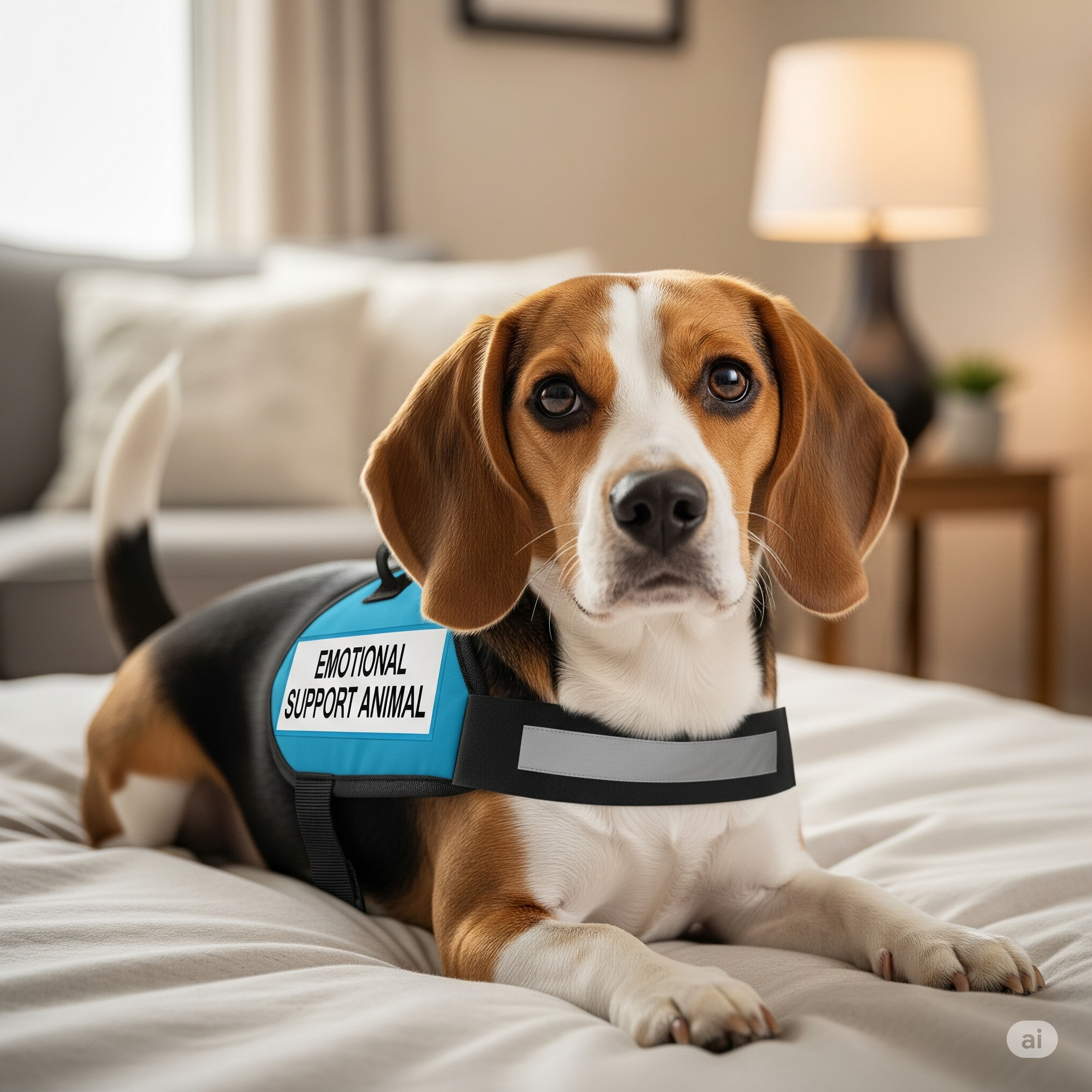Navigating college life can be a significant undertaking, and for many students, the added layer of managing mental health conditions can make it even more challenging. In recent years, Emotional Support Animals (ESAs) have emerged as invaluable companions, offering comfort, stability, and a sense of calm amidst the academic and social pressures. However, understanding the specific rights and responsibilities associated with having an ESA in student housing is crucial for both students seeking support and the housing providers accommodating them. This guide aims to clarify the legal landscape, application processes, and daily considerations for ESAs in university settings.
Understanding Emotional Support Animals (ESAs)
An Emotional Support Animal is a companion animal that provides therapeutic benefit to an individual with a mental or emotional disability. It’s important to distinguish an ESA from a service animal. Unlike service animals, which are individually trained to perform specific tasks directly related to a disability (e.g., guiding a visually impaired person, alerting to seizures), ESAs are not required to have any specialized task-training. Their primary role is to offer comfort and companionship simply through their presence, which helps to alleviate symptoms of a recognized mental or emotional disability.
Legal Protections for ESAs in Student Housing
The legal framework for ESAs in housing is primarily governed by federal laws, which educational institutions, especially those receiving federal funding, must uphold.
Fair Housing Act (FHA)
The Fair Housing Act (FHA) is the cornerstone of ESA housing rights. This act prohibits discrimination in housing based on disability and requires housing providers, including universities, to make reasonable accommodations for individuals with disabilities. This means that if a student has a qualifying mental or emotional disability and an ESA is necessary to mitigate its symptoms, the university must generally allow the ESA in housing facilities, even those with a strict “no pets” policy (U.S. Department of Housing and Urban Development [HUD], 2020). Landlords and housing providers cannot charge pet fees or deposits for an ESA.
Americans with Disabilities Act (ADA) and Section 504 of the Rehabilitation Act
While the Americans with Disabilities Act (ADA) primarily covers public accommodations and does notgrant ESAs the same broad public access rights as service animals (meaning ESAs typically aren’t allowed in classrooms, libraries, or dining halls unless specifically permitted by campus policy), Section 504 of the Rehabilitation Act of 1973 is highly relevant to student housing. Section 504 applies to federally funded educational institutions and ensures that students with disabilities have equal access to housing accommodations. This reinforces the FHA’s mandate for reasonable accommodations, including allowing ESAs, in university housing.
Obtaining Approval for an ESA in Student Housing
Securing approval for an ESA in student housing involves a formal process that requires proper documentation and adherence to university policies.
Documentation Requirements
To qualify for an ESA accommodation, students must provide specific documentation from a licensed mental health professional (LMHP). This professional could be a psychiatrist, psychologist, therapist, social worker, or licensed counselor. The documentation must clearly state:
- The student has a mental or emotional disability that is recognized in the Diagnostic and Statistical Manual of Mental Disorders (DSM-5, or its most current edition).
- The Emotional Support Animal is necessary to alleviate one or more identified symptoms of the student’s disability. There must be a direct link between the presence of the animal and the therapeutic benefit.
The documentation should be current, signed by the LMHP, and include their license type, number, and the state in which they are licensed. It should also be on the LMHP’s official letterhead.
Application Process
Most universities have a structured application process for requesting housing accommodations for an ESA. While specifics may vary, the general steps typically include:
- Contact Disability Services: The first step is usually to initiate the process by reaching out to the university’s disability services office, accessibility services, or student health center. They can provide specific forms and guidance.
- Submit Documentation: Provide the necessary, comprehensive documentation from your LMHP. Ensure it meets all university requirements.
- Review Period: The university will review your request and submitted documentation. This review process may involve consultation with their own accessibility or health professionals and can take several weeks, so it’s advisable to start early.
- Decision Notification: Students will be formally informed of the university’s decision, along with any additional requirements or guidelines if the request is approved. This might include specific animal health requirements or campus-specific rules.
Responsibilities of ESA Owners in Student Housing
Students approved to have an ESA in campus housing must adhere to important responsibilities to ensure a safe and harmonious living environment for all residents. It’s not just about your rights, but also about being a responsible pet owner and community member.
- Animal Care: You are responsible for ensuring your ESA is well-cared for. This includes providing adequate food and water, proper grooming, regular veterinary visits to maintain its health and vaccinations, and appropriate exercise.
- Behavior: The ESA should be well-behaved and not pose a direct threat to the health or safety of others. It should not cause significant property damage or create an undue burden on the university. This means managing excessive barking, aggression, or destructive behaviors.
- Cleanliness: Maintaining cleanliness in your living area and managing the ESA’s waste appropriately is paramount. This includes promptly cleaning up messes, using litter boxes for cats, and properly disposing of waste in designated areas.
- Compliance: You must abide by all university housing policies and agreements related to ESAs, which may include specific rules about how the animal is transported through common areas, noise levels, and any designated animal relief areas.
- Supervision: The ESA must be under the control of its owner at all times. This often means being leashed or in a carrier when outside your specific housing unit.
Limitations and Considerations
While ESAs offer significant benefits and are protected by law in housing, there are important limitations and considerations for students to be aware of.
- Public Access: As noted, ESAs are generally not granted the same broad public access rights as service animals under the ADA. This means your ESA may not be permitted in classrooms, labs, dining halls, recreation centers, or other non-housing campus areas unless the university grants specific permission or if the animal is deemed a service animal (e.g., a psychiatric service dog specifically trained for tasks, which falls under a different legal category).
- Denial of Accommodation: A university may legally deny an ESA request under specific circumstances. These include:
- If the animal poses a direct threat to the health or safety of others (e.g., documented aggression, unmanageable disease).
- If the animal would cause substantial physical damage to the property of others that cannot be mitigated.
- If the request would impose an undue financial and administrative burden on the institution (though this is a high bar for universities to meet in housing contexts).
- If the animal’s presence would fundamentally alter the nature of the housing program (e.g., a sterile lab environment that doubles as student housing).
- Exotic Animals: While federal law applies to “domesticated animals,” universities may have policies regarding exotic, wild, or inherently dangerous animals, which might not be approved as ESAs.
- Student Responsibility: The university is not responsible for the care, feeding, or training of the ESA. All associated costs and responsibilities fall solely on the student owner.
Benefits of ESAs for Students
Beyond the legalities, the emotional and psychological benefits that ESAs provide to students are well-supported by research and countless personal experiences. College can be a high-stress environment, and an ESA can serve as a vital coping mechanism.
- Reduced Anxiety and Depression: The unconditional love and non-judgmental presence of an ESA can significantly alleviate symptoms of anxiety and depression. Interacting with animals has been shown to lower cortisol levels (stress hormone) and increase oxytocin (bonding hormone) (Brooks et al., 2018).
- Enhanced Social Interaction: While often serving an individual, ESAs can also act as social facilitators. They can initiate conversations with peers, helping to reduce feelings of isolation and foster a sense of community.
- Improved Emotional Regulation: The routine of caring for an animal can provide structure and purpose, which is beneficial for managing mood swings and emotional dysregulation. The calming effect of petting or interacting with an ESA can help students self-soothe during stressful periods.
- Stress Reduction: The simple act of cuddling with an animal can provide immediate stress relief, offering a comforting presence during exam periods, social pressures, or personal challenges.
- Combating Loneliness: For students living away from home for the first time, an ESA provides a constant companion, alleviating feelings of loneliness and homesickness.
- Motivation for Self-Care: Having an animal to care for can motivate students to engage in self-care activities, such as taking walks or maintaining a consistent schedule, which indirectly benefits their mental health.
Conclusion
Emotional Support Animals play a vital and increasingly recognized role in supporting students with mental health challenges as they navigate the complexities of higher education. Understanding the legal framework provided by the Fair Housing Act and Section 504, familiarizing yourself with the university’s application process, and embracing the responsibilities of ESA ownership are all crucial steps.
By properly documenting your need and adhering to guidelines, you can ensure a harmonious living environment for yourself, your cherished ESA, and all residents in student housing. The presence of an ESA can be a transformative element in a student’s mental health journey, providing a stable anchor amidst the ebb and flow of college life.
For personalized assistance in obtaining a legitimate ESA letter that meets federal guidelines and university requirements, connect with a licensed mental health professional. CertifyESA can help you navigate this process by connecting you with qualified LMHPs who understand the specific documentation needs for student housing accommodations.
References
Brooks, H. L., Rushton, K., Lovell, K., Bee, P., Walker, L., Grant, L., & Rogers, A. (2018). The power of support from companion animals for people living with mental health problems: A systematic review and narrative synthesis of the evidence. BMC Psychiatry, 18(1),1 31. https://doi.org/10.1186/s12888-018-1613-2
U.S. Department of Housing and Urban Development. (2020). Assistance Animals Notice: FHEO-2020-01. Retrieved from https://www.hud.gov/sites/dfiles/PA/documents/HUDAsstAnimalNC1-28-2020.pdf
Additional references for this type of article would typically include specific university policies on ESAs and potentially studies on student mental health and pet ownership. The provided references are a good start.





